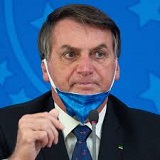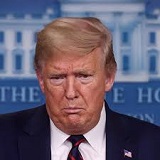|
TRANSLATE THIS ARTICLE
Integral World: Exploring Theories of Everything
An independent forum for a critical discussion of the integral philosophy of Ken Wilber
  Frank Visser, graduated as a psychologist of culture and religion, founded IntegralWorld in 1997. He worked as production manager for various publishing houses and as service manager for various internet companies and lives in Amsterdam. Books: Ken Wilber: Thought as Passion (SUNY, 2003), and The Corona Conspiracy: Combatting Disinformation about the Coronavirus (Kindle, 2020). Frank Visser, graduated as a psychologist of culture and religion, founded IntegralWorld in 1997. He worked as production manager for various publishing houses and as service manager for various internet companies and lives in Amsterdam. Books: Ken Wilber: Thought as Passion (SUNY, 2003), and The Corona Conspiracy: Combatting Disinformation about the Coronavirus (Kindle, 2020). TABLE OF CONTENTS | REVIEWS
Coping with Corona: The Cautious vs. The RecklessThe Corona Conspiracy, Part 8Frank Visser
I think some common sense might work wonders in this general atmosphere of hysteria on the one hand and paranoia on the other.
What has struck me most during my weeks of researching the current Corona pandemic are the different responses and theories it has generated among the educated and not-so-educated public. On the one hand we have the scientific view, which has taken this pandemic as something to be understood and battled, or even prevented in the future. All over the world, thousands and thousands of studies have been and are being published detailing the workings of the SARS-CoV-2 virus, often even before the scientific community has been able to filter the wheat form the chaff. On the side of society, there is a sharp division between those who accept the efforts and conclusions of science as rational and sensible—even if always tentative—and therefore subject themselves freely to the prescriptions of mask-wearing and social distancing, and those who vehemently oppose these measures, often with quasi-religious arguments about individual freedom and alternative medicine. For that science-skeptical group, the danger doesn't lie in a new and unknown virus, but in an evil and hostile government that threatens our basic freedom and is bent on enslaving and poisoning us with vaccines. This has become a veritable culture war, especially in the United States, but also in the Netherlands, where we see a vocal resistance movement emerging, under the flag of "Virus Madness" (later rebranded as "Virus Truth"). This resistance movement is a mixed and colorful lot, with dissident-scientists and conspiracy thinkers spanning the spectrum of reason and unreason. There are religious overtones here, when members of this group see themselves as "seekers" and "Truthers", who don't buy the conventional wisdom about this particular virus, or viruses as such, but claim to have deeper knowledge of "what is really going on", often after having done their own "research" on the internet among the like-minded who inhabit this internet conspiracy bubble. There also seems to be a more general psychological disposition at play here: indvidualistic versus collectivistic, or reckless versus cautious. Those in favor of governance are more likely to comply with government policies than those of a more libertarian bent, who don't like to be told "what to do". In general, European countries have experienced less resistance to the global lockdown measures compared to the US, because there is less distrust towards the government. But that can change if these stringent measures continue to be imposed for a longer time and the economic recession will set in, or a second wave emerges. The Science View: Fighting the VirusAs soon as reports of a new pandemic came in, early 2020, scientists have frantically tried to get a grip on this phenomenon. Every aspect of the virus has been studied, analyzed, reported and commented on in scientific journals, often through preprints that haven't gone past peer review yet. The urgency of the whole situation caused an unprecedented exchange of information and discoveries between scientific professionals. Yet, though the SARS-CoV-2 virus has been sequenced to the base pair level (it contains about 30.000 nucleotides such as A, C, G and T), a lot is still unkown (see Part 1 and Part 6). Much debate is happening around questions such as: How does the virus spread? Is it through large drops or also the tiny aerosoles? And if the latter, how much virus material do these tiny drops contain, and how infectious are these particles actually? How effective and/or harmful is the wearing of masks? How effective is a lockdown and social distancing? How long should it be continued? Will there be any vaccine in time, and will that be effective and safe? How long does immunity last if you have had the disease? Or if you have been vaccinated? How many people are infected but asymptomatic? When will herd immunity be realized, if at all? And so on, and so forth. Within a healthy scientific community these questions can be discussed openly and critically, without any hidden agendas. This cautious approach can go to the extreme of germophobia. Does transmission occur through objects, door posts and handshakes? Should we wear masks when outdoors, indoors, or everywhere? Is it safe to see other people, children, your parents or grandparents? Alarmism is also around the corner: will this pandemic wipe out millions of people, and affect even more millions with debilitating damage to lungs and other organs? Will we be able to contain the spread of this new virus at all, given its versatility and mutability? Will this "war on germs" go down the same unsuccessful route as the "war on drugs" or the "war on terror"? Is fear worse than the virus itself? The scientific literature on the coronavirus is now so extensive that one can find evidence for almost every opinion. True science weighs all of these opinions, pseudo-science takes one of them and runs with it. We are in an infodemic (see Part 14) as well as a pandemic. The Opposite View: Boost the Immune SystemGiven the uncertainty of the situation, a lot of fear and concerns have emerged among the population. Some of it justified, some of it irrational. Many in the field of alternative medicine argue that this war on germs is misguided. We should, instead, boost our immune systems, instead of blindly focussing on germs as the cause of disease. The germ theory should be replaced by the so called terrain theory, which holds that illness is not caused by germs but by toxins, which weaken us so germs (bacteria, fungi, viruses) can invade our bodies. Some even see these little creatures as largely beneficial, in that they remove dead cells. There is also concern about the speed in which vaccines are developed and distributed: will this be safe and effective, where this process normally takes years (if it is successful at all)? Given the case that most victims of SARS-CoV-2 have been elderly people with many underlying illnesses, shouldn't we focus our efforts on staying healthy throughout old age, avoiding diet-related illnesses such as obesity and diabetes? This view too can go to extremes. Some alternative health medics claim viruses are harmless, because they have been around forever. A drop of sea water contains 10 million viruses, it is estimated. All health issues are the result of toxic substances in our food and in the environment, and we should remove these from our diets as much as possible to stay healthy. This can even lead to toxicophobia: the irrational belief that any additive to our food is harmful. Given this view of health and disease, some have even gone further and claim that the whole pandemic is a farce, set up by the vaccine industry, headed by Bill Gates, to sell us vaccines (and make millions in the process). Some see a sinister plan behind all this ("plandemics"), coming from obscure power elites which run the show of world affairs. There are the familiar "5G spreads the virus" conspiracy theories, which seem to inspire some to burn down 5G masts in various countries (see Part 1). There's a common atmosphere of pervasive paranoia behind all this. And there are claims that all these widely distributed rumors that coronavirus cases are just "false positives", caused by the unreliability of the tests used, and in service of keeping the pandemic scare high enough for us to comply with all the lockdown measures. And there's an even more extreme version of this, as we have seen in Part 7 of this series: some deny the very existence of the SARS-CoV-2 virus—even of all viruses as such. Andrew Kaufman has argued that what is seen on electron microscope pictures as viruses are in fact cell particles known as exosomes. These serve a useful function in cell communication and waste disposal (see Part 3 and Part 4). Viruses as such, he claims, have never been isolated and proven to be the cause of diseases. He is inspired by Stefan Lanka, a German biologist turned alternative health medic, who has denied the existence of viruses for decades. The fact that viruses are sequenced these days to the very base pair in a matter of hours doesn't seem to impress these old school amateur virologists (or should we say no-virologists?) Some populist politicians (in the UK, Brazil and the US) have argued the whole pandemic is really nothing to worry about. Boris Johnson confidently kept shaking hands with his voters (and with patients) until he caught COVID-19 himself. Jair Bolsonaro stubbornly refused to implement lockdown measures and wear a mask, until he recently got a positive corona test himself. And Donald Trump has belittled the pandemic from the start, in favor of a speedy reopening of the economy, taking irresponsible risks for the health of his fellow Americans. They represent and personify the reckless segments of society, where it is claimed that viral diseases have always been under us and will always be. You have to die of something.
Three reckless politicians downplaying the risk of the worldwide pandemic.
Common Sense: The Best of Both WorldsI think some common sense might work wonders in this general atmosphere of hysteria on the one hand and paranoia on the other. Is the cure worse than the disease, as lockdown-skeptics claim? It all depends on how the risk of the pandemic is estimated. For that we need real science to guide us. And is it misguided to fight off the virus, as alternative health medics tell us? We are not really fighting the virus, but preventing it from multiplying itself through social distancing and other measures. Or should we rather simultaneously seek for a cure, and strive to increase the general health condition of the population, so people are less susceptible to viral diseases? And, let's not forget, look more closely at what we are doing to the natural habitats of bats and other animals that are known to be reservoirs to a host of viruses. Easier said than done with the current overpopulation. Yes, viruses are everywhere around us, in the ground, the air and the sea and in our bodies, but not all of them are harmful to humans. Most viruses in the sea are bacteriophages, that attack bacteria, and play an important role in marine ecology.[1] Some, however, are definitely harmful, and SARS-CoV-2 is one of these. Nature is not one big harmony, as alternative health celebrities want us to believe. And yes, having a good immune system is important, but why would we have an immune system in the first place if not to prevent viruses to make us sick? Furthermore, it is scientifically not at all established that we can "boost" our own immune systems, as we read here: The idea of boosting your immunity is enticing, but the ability to do so has proved elusive for several reasons. The immune system is precisely that—a system, not a single entity. To function well, it requires balance and harmony. There is still much that researchers don't know about the intricacies and interconnectedness of the immune response. For now, there are no scientifically proven direct links between lifestyle and enhanced immune function.[2] As to the frequently heard claim (repeated by Andrew Kaufman) that coronavirus tests will almost always be positive, thus artificially increasing the number of "cases" in a country, this is a fable—in fact, false negatives are much more common. We could find no evidence that labs are deliberately manipulating COVID-19 test results to create false-positives. Similarly unproven claims have been circulating for weeks and echo months-old conspiracy theories. Jeffrey Sebelia, the source of the Facebook post, said it was a "word-of-mouth story" from his mom. He had no further proof to support the claim. While COVID-19 tests may sometimes produce false-positive results, they're rare. Experts are more concerned about false-negatives. Data currently shows more than 90% of coronavirus tests come back negative.[3] As to viruses being non-existent (see Part 7) or actually being exosomes (see Part 2), I was amused to find out that Judy Mikovits, a now discredited virologist turned conspiracist, who featured prominently in the Plandemic documentary, lectured Andrew Kaufman on the difference between viruses and exosomes. Now, if you get lectured by such a suspect scientist as Mikovits, you are really in deep trouble.[4] Now, by calling the science view "cautious" and the opposite view "reckless", many in the opposing camp will turn the tables. They see vaccines and mask wearing as reckless (or useless) technology and argue for the need to take responsibility for your own health. In their philosophy: if you are healthy you can't get sick. And if you get sick you were already sick... from toxins. Unfortunately, a virus can harm anyone.[5] Ask Novak Djokovic, "a health and fitness freak if there ever was one", who is now called "Djocovid-19" since he contracted the disease, during a tennis tournament in several Balkan cities which he organized without the proper precautions. Seeing this as one big drama of freedom and oppression is short-sighted, narcissistic and irresponsible, in my opinion. Instead of framing this as the cautious versus the reckless, anti-lockdown thinkers would rather choose the brave versus the fearful, or the rebellious versus the oppressed. Yes, the costs of the lockdown are high, but it's better to be safe than sorry. By far the sanest comment came from virologist James Hildreth—who got so misquoted by Andrew Kaufman as supporting his weird virus-equals-exosome theory, as we have documented in Part 2 and Part 3 of this series: The virus is real. The pandemic is real and is caused by the virus. Period.[6]
So let's be cautious, listen to science, stay healthy, and don't endanger others by infecting them unknowingly. Wear a mask when in public. Use common sense. NOTES[1] Ann C. Gregory et.al., "Marine DNA Viral Macro- and Microdiversity from Pole to Pole", Cell, April 25, 2019. [2] "How to boost your immune system", Harvard Health Publishing. [3] Daniel Funke, Emily Venezky, "Fact-checking claims about nurses getting nothing but false-positive COVID-19 tests", politfact.com, July 2, 2020. [4] Andy Kaufman, "Panel with Judy Mikovitz and Marcy Cravat", www.youtube.com, 16 Jun 2020. Mikovits states at the start of this interview: I saw on the chats, or on the things at the side of YouTube... that viruses are exosomes, and that's not true. Viruses are by themselves infectious agents.[8:37] Mikovitz is downplaying the fact that this was Kaufman's central thesis: viruses are actually exosomes. It was not just some random comment in a YouTube chat. It doesn't prevent Mikovitz from agreeing with Kaufman that this particular SARS-CoV-2 virus hasn't been "isolated" yet. Really? So some viruses exist, some don't? [5] Amy McKeever, "Here's what coronavirus does to the body", National Geographic, Feb. 18, 2020. [6] James Hildreth on Twitter, 9 May 2020.
83 Vaccine Myths from docbastard.net
To all those who claim SARS-CoV-2—or any virus—does not exist: the virosphere consists of 7 realms
11 kingdoms, 22 phyla, 4 subphyla, 49 classes, 93 orders, 12 suborders, 368 families, 213 subfamilies, 3,769 genera, 86 subgenera, 16,215 species. Take that.
https://talk.ictvonline.org/taxonomy/
A summary of early parts of this series has appeared in the Dutch magazine Skepter 33(3), September 2020, as "Viruses don't exist" (covering Parts 1-5). German: Skeptiker (December 2020); English: Skeptic.org.uk (January 2021)
Comment Form is loading comments...
|



